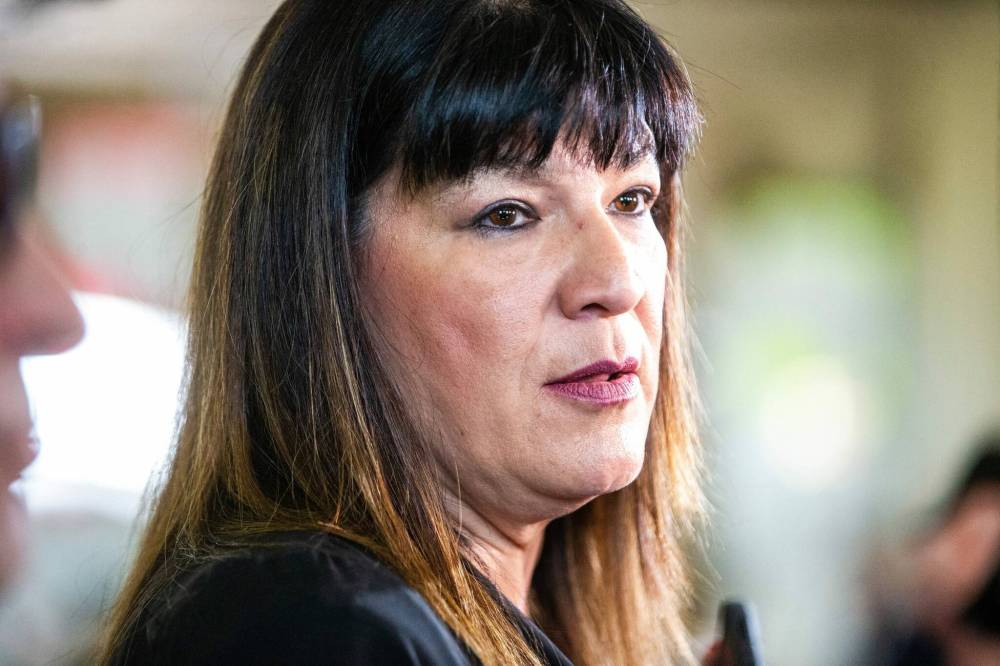Outreach workers and volunteers will walk the streets and enter encampments this week to gather information about the homeless population in a concerted effort to better help them.
Housing Minister Bernadette Smith promised the provincial government will take the findings of the street census, organized by End Homelessness Winnipeg, to heart.
“This will help guide our work here in the province and here as a government,” Smith told people gathered at the project launch on Tuesday.

MIKAELA MACKENZIE / FREE PRESS FILES
Bernadette Smith, Manitoba’s minister of housing, addictions, and homelessness, said data gathered from the homelessness census will inform the provincial government’s work.
“The work that you’re going to be doing for the next couple of days is super essential for the work that we’re doing at the province, because data collection guides this work and helps us understand what the needs are, where we need to go… and how we can best support our relatives.”
The 2024 census, which is the fourth full census since 2015, will take place over four days rather than 24 hours as in previous years.
Co-ordinator Aynslie Hinds said approximately 200 trained volunteers will work from four stations throughout the city beginning Wednesday.
Outreach workers from various social services organizations will conduct surveys at encampments where they have relationships with the residents. Organizations that serve newcomers, youth and women, will also participate.
Hinds said they expect the survey to show the number of homeless is on the rise, because of the bigger push to survey people.
She said the census will reach farther out from downtown to outlying neighbourhoods, where homelessness has become more visible.
Steph Bisson, a spokesman for End Homelessness, said they hope to find so-called hidden homelessness — people who couch surf or live in vehicles, for example.
Ash Burkowski, who was sometimes homeless as a youth due to a difficult home life and once as an adult after an illegal eviction, sat on the census steering committee.
“When I was homeless, I felt invisible and like I didn’t matter,” said the 41-year-old.
Burkowski said the information that’s gathered “can give us a picture of what is really happening.”
The final report is expected to be released in spring 2025.
Data is collected from shelters and social service organizations and homeless people are asked about their age, ethnicity, length of time they’ve been without a home, what services they’ve sought and where they’re from originally, as well as what contributed to them losing housing.
Hospitals, jails and child welfare agencies have been asked to contribute information.
It’s part of a federal government-funded effort to conduct censuses and collect data on homelessness in municipalities across Canada.
Jason Whitford, CEO of End Homelessness Winnipeg, said the census is meant to gather more than just numbers.
“It’s gathering their stories, documenting the truth and the realities that they face, but also what happened in their lives that resulted in them being in the situation that they find themselves in,” he said.
“This information provides a meaningful snapshot image of the situation of houselessness of urban centres across the country — and that should compel decision makers to invest accordingly.”
He said systemic issues that underpin homelessness include discharges from health-care settings and correctional institutions, as well as young people aging out of the child-welfare system.
erik.pindera@freepress.mb.ca

Erik Pindera
Reporter
Erik Pindera is a reporter for the Free Press, mostly focusing on crime and justice. The born-and-bred Winnipegger attended Red River College Polytechnic, wrote for the community newspaper in Kenora, Ont. and reported on television and radio in Winnipeg before joining the Free Press in 2020. Read more about Erik.
Every piece of reporting Erik produces is reviewed by an editing team before it is posted online or published in print — part of the Free Press‘s tradition, since 1872, of producing reliable independent journalism. Read more about Free Press’s history and mandate, and learn how our newsroom operates.
Our newsroom depends on a growing audience of readers to power our journalism. If you are not a paid reader, please consider becoming a subscriber.
Our newsroom depends on its audience of readers to power our journalism. Thank you for your support.